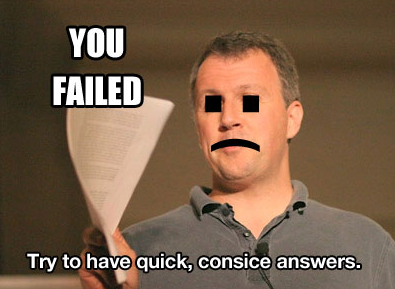Going up for seed funding can be like going out on a first date. You're nervous. Your palms may be a little sweaty. Then there's tons of getting to know you questions. It's something tons of hopefuls are undergoing right now at Y Combinator.
Today, we ran across a list of questions asked at a Y Combinator interview. Seems the guys over at Stackblaze even put together an app where you have 15 seconds to answer each question. Think fast, or else you'll see:

Going through the actually list of questions, we found that there was a common theme of not just getting to know you, but challenging startups about who their customers are. The questions seek to get to the root of why a startup is doing what it is doing. Let's take a closer look.
Why I'm I Doing This At All?
On the list of questions, you'll encounter 'why' questions such as these:
- Why did you pick this idea to work on?
- Why did you choose this idea?
- Why did your team get together?
- Why will you succeed?
We've talked before about the importance of asking "why" before you do anything. We're big fans of Simon Sinek and his book "The Power of Why." He talks about how every inspiring leader, including Apple, starts with asking "why." Here's how Sinek explains it:
Here is how Apple actually communicates: Why? Everything we do we believe in challenging the status quo. We believe in thinking differently. How? The way we challenge status quo is by making our products beautifully designed simple to use, and user friendly. What? We just happen to make great computers. Want to buy one?
Asking "why" first allows you to better answer other questions, such as "how" and "what." More importantly, it let's you better define what it is you want to accomplish, better understand how your product helps solve a customer's problem. It gives purpose. Basically, you're answering, "Why I'm I doing this at all?"
'Who Is Going to Use Your Product?
When it comes to who your potential customers are, these are the questions you might encounter:
- Who needs what you're making?
- Who would use your product?
- Who is go to be your first paying customer?
- What do you understand about your users?
- How are you meeting customers?
- How you know people want this?
Remember Eric Ries? His first startup crashed and burned because he spent six months building a product nobody wanted to use. Then there's Josh Levy and Ross Cohen, BeenVerified's co-founders, who burned through $550,000 in funding without getting a single customer. All because they spent years developing a product that didn't have a market.
It's not a good idea to develop a product in silence for six months without feedback or doing a single user test to see if your idea actually solves a customer's problems. It's crucial you solicit feedback from the start or risk failure. More than that, delving deep into who your customers exactly are, learning their habits and culture is the first step in seeing if someone would actually use your products.
Getting to Know You, Getting to Know All About You
Of course, there are the interview questions that try to ferret out who you really are, how you work and how you think. Questions such as:
- What's the biggest mistake you've made?
- Who is "the boss"?
- What problems/hurdles are you anticipating?
Then again, all the questions could be considered getting to know you and your leadership abilities. Which is important for the man who has placed more bets on Internet startups than anyone else in Silicon Valley — Ron Conway. Along with Yuri Milner, Ron offers every new YC startup $150K. Ron told us what he looked for in a startup at his soapbox talk last year:
We invest in people first, idea second, market size third. It's our belief that the idea that we're seeing is going to morph so much that we should not get wedded to the idea, we should get wed to the individuals. The traits we look for: Can this person be a leader? Can this person lead a team?
90% of the time it's a group of three founders. We always looks for the dynamic between the three people. Will there be any problems along the way? Will they realize that their idea is not working and have a solution to fix it?
Hopefully, you've got a clearer idea of what you might face when your startup goes up for seed funding whether it's with YC or someone else. But remember, before you start knocking on doors with money, ask "why" first and figure out who will exactly benefit from your product. After all, a product without a user is nothing.